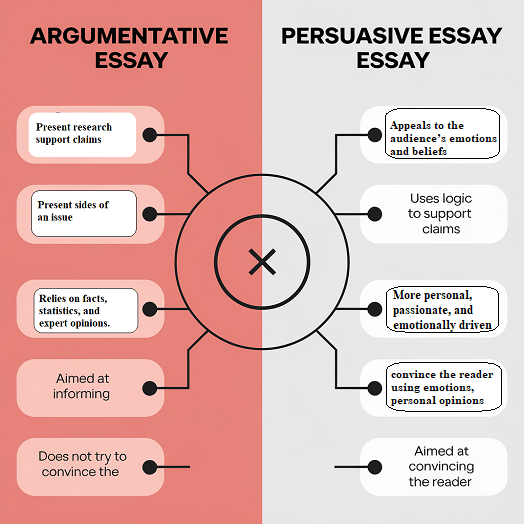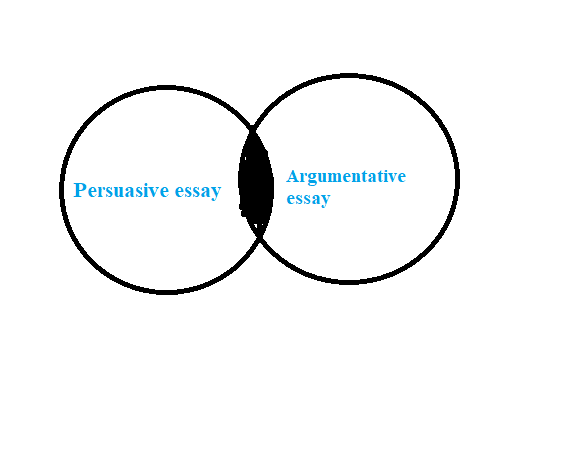Writing is a powerful tool for expressing ideas, influencing opinions, and presenting well-reasoned arguments. However, not all forms of writing serve the same purpose. Two commonly confused styles are persuasive and argumentative writing.
While both aim to convince the reader, their approach, structure, and reliance on evidence differ. Argumentative writing focuses on logic, presenting facts, data, and counterarguments to support a claim, making it more objective.
Persuasive writing appeals to emotions, personal beliefs, and rhetorical strategies to sway the audience. Understanding these differences is essential for mastering effective communication in academic essays, debates, or everyday discussions.
What is an argumentative essay?
An argumentative essay is a type of academic writing that presents a clear stance on a specific issue and supports it with logical reasoning, evidence, and analysis. The goal is to persuade the reader by constructing a well-structured argument that includes a strong thesis, supporting points, and counterarguments with rebuttals. Unlike opinion-based writing, an argumentative essay relies on facts, research, and credible sources to support claims. It follows a structured format, including an introduction, body paragraphs, and a conclusion, ensuring a logical flow of ideas. An argumentative essay strengthens its position and encourages critical thinking by addressing opposing views and refuting them effectively.
What is a Persuasive Essay?
A persuasive essay is a type of academic writing that aims to convince the reader to adopt a particular viewpoint or take a specific action. Unlike an argumentative essay, which relies heavily on logic and evidence, a persuasive essay often appeals to emotions, ethics, personal beliefs, and facts.
It presents a clear thesis statement, supports it with compelling arguments, and addresses counterarguments to strengthen its stance. The structure typically includes an introduction, body paragraphs, and a conclusion, ensuring a smooth and convincing flow of ideas. A compelling essay effectively influences readers’ thoughts and decisions using rhetorical devices, persuasive language, and potent reasoning.
Difference between the argumentative essay and persuasive essay example
Argumentative Essay
“Research shows that school uniforms improve student discipline and reduce bullying. A 2019 study found that schools with uniform policies reported a 12% decrease in behavioral issues compared to those without. While some argue that uniforms limit self-expression, the benefits of unity and academic focus outweigh this concern.”
Persuasive Essay
“Imagine being bullied just because you can’t afford trendy clothes. School uniforms eliminate this problem by creating equality. No student should feel left out because of their attire. It’s time to make schools a place of learning, not fashion shows!”
Both essays aim to convince, but the argumentative essay relies on facts and logic, while the persuasive essay appeals to emotions and personal beliefs.
Various Argumentative vs Persuasive Essay Topics
Argumentative Essay Topics (Requires research, logic, and evidence)
- Should college education be free for all students?
- Does social media hurt mental health?
- Should the death penalty be abolished worldwide?
- Is climate change the biggest threat to humanity?
- Should junk food be banned in schools?
- Are standardized tests an accurate measure of student intelligence?
- Is artificial intelligence a threat to human jobs?
- Should there be stricter gun control laws?
- Is homeschooling better than traditional schooling?
- Should voting be mandatory in all democratic countries?
Persuasive Essay Topics (Uses emotions, personal beliefs, and rhetorical appeals)
- Why everyone should adopt a pet instead of buying one
- Why schools should have shorter school days
- Why social media should have stricter regulations on fake news
- Why students should be allowed to use phones in class
- Why everyone should switch to a plant-based diet
- Why donating to charity should be a habit for everyone
- Why high school students should be required to do community service
- Why reading books is better than watching TV
- Why junk food should come with warning labels like cigarettes
- Why exercise should be a daily habit for everyone

Key Differences Between Argumentative and Persuasive Writing
|
Argumentative Writing
|
Persuasive Writing
|
| Purpose |
To present a balanced, logical argument based on evidence. |
To convince the reader using emotions, personal opinions, and rhetorical appeals. |
| Use of Evidence |
Relies on facts, statistics, and expert opinions. |
It may use some evidence but often focuses on emotional appeals. |
| Tone |
Formal, objective, and logical. |
More personal, passionate, and emotionally driven. |
| Counterarguments |
Includes counterarguments and refutes them with logic. |
Rarely presents counterarguments; focuses on strengthening the main claim. |
| Audience Approach |
Encourages critical thinking and analysis. |
Appeals to the audience’s emotions and beliefs. |

When to Use Each Style
- Use argumentative writing in academic research papers, policy discussions, and debates where evidence-based reasoning is essential.
- Use persuasive writing in advertisements, opinion pieces, speeches, and campaigns where emotional influence plays a key role.
Read on 14 types of Essay with Examples
Final thought
While argumentative and persuasive essays aim to convince readers, their approach and structure differ. An argumentative essay relies on logic, research, and factual evidence to present both sides of an issue before making a reasoned conclusion.
In contrast, a persuasive essay focuses more on emotional appeal, personal opinions, and rhetorical techniques to sway the audience. Both forms of writing require strong arguments and transparent organization. Still, the key distinction lies in how they persuade argumentative essays emphasize reason and evidence, while persuasive essays appeal to emotions and beliefs. Understanding these differences helps students choose the right approach for their purpose and audience.









 Evan John
Evan John
